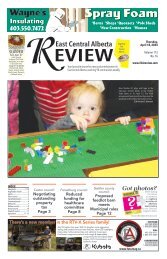ECA Review 2023-01-05
ECA Review 2023-01-05
ECA Review 2023-01-05
Create successful ePaper yourself
Turn your PDF publications into a flip-book with our unique Google optimized e-Paper software.
2 January 5'23 HANNA/CORONATION/STETTLER, AB. <strong>ECA</strong> REVIEW<br />
OPINION<br />
The opinions expressed are not necessarily<br />
the opinions of this newspaper.<br />
<br />
VIEWPOINT<br />
Trudeau giving<br />
Quebec a special<br />
deal on carbon taxes<br />
by Franco Terrazzano,<br />
Canadian Taxpayers Federation<br />
All provinces are equal. But one<br />
province is a little more equal in the<br />
eyes of Prime Minister Justin<br />
Trudeau.<br />
Next year, taxpayers in every province<br />
will have to pay his government’s<br />
mandatory minimum carbon tax rate.<br />
Every province but one: Quebec.<br />
Quebec started in early on carbon<br />
taxes, establishing a cap-and-trade<br />
system with California in 2<strong>01</strong>4, when<br />
Stephen Harper was prime minister.<br />
Then in 2<strong>01</strong>8 the Trudeau government<br />
imposed a carbon tax backstop to<br />
be paid by any province that hadn’t<br />
made its own arrangements to implement<br />
a carbon<br />
tax.<br />
“<br />
Under it, nine<br />
provinces and<br />
the three territories<br />
are required<br />
to raise the<br />
carbon tax to 14<br />
cents per litre of<br />
gas next year,<br />
going to 37 cents<br />
per litre by 2030.<br />
But the backstop<br />
doesn’t apply to<br />
Quebec.<br />
Though theoretically<br />
there’s<br />
advice.<br />
no limit to the<br />
province’s capand-trade<br />
cost,<br />
which is the result of demand and<br />
supply, it’s currently nine cents per<br />
litre of gas. Next year, by law, it must<br />
stay above five cents per litre. But<br />
nothing requires it to be higher than<br />
that. Meanwhile, everyone else in<br />
Canada will be paying 14 cents per<br />
litre.<br />
In 2030, Quebec’s carbon tax is forecast<br />
to reach 23 cents per litre of gas.<br />
But everyone else will be paying 37<br />
cents per litre. That means that in<br />
2030, an Ontario family will pay $10<br />
more when they fuel up their minivan<br />
because of the carbon tax than drivers<br />
in Trudeau’s Montreal riding.<br />
Even La Presse notes that Quebec’s<br />
tax “is much less than in the federal<br />
system.”<br />
The key part of the federal backstop<br />
is “ensuring that carbon pricing is<br />
in place across Canada at a similar<br />
level of stringency.” But if there’s supposed<br />
to be a “similar level of<br />
stringency,” then why will Quebec’s<br />
tax cost be 14 cents per litre less by<br />
2030?<br />
Is there some scientific reason to<br />
explain Quebec’s lower tax? Or is it<br />
because Ottawa’s carbon tax is about<br />
Instead of<br />
bullying Nova Scotia<br />
the prime minister<br />
should be asking<br />
Nova Scotians for<br />
politics, not the environment?<br />
Compare Quebec with Nova Scotia<br />
and it’s clear it’s the latter. Nova Scotia<br />
currently has a provincial cap-andtrade<br />
carbon tax, too. And Nova Scotia<br />
has reduced its emissions by 36 per<br />
cent since 20<strong>05</strong>, Quebec only by 12 per<br />
cent. But Ottawa isn’t letting Nova<br />
Scotia off. Beginning next year, Nova<br />
Scotians will have to pay the higher<br />
federal tax, too — though Quebec gets<br />
to keep its system.<br />
Instead of bullying Nova Scotia the<br />
prime minister should be asking Nova<br />
Scotians for advice. The province’s<br />
carbon tax now costs about two cents<br />
per litre of gas, by far the lowest rate in<br />
Canada. Yet since 20<strong>05</strong>, Nova Scotia<br />
has somehow<br />
managed to<br />
reduce its emissions<br />
more than<br />
every other province<br />
except New<br />
Brunswick.<br />
On the other<br />
hand, British<br />
Columbia had the<br />
highest carbon<br />
tax in Canada for<br />
years yet B.C.’s<br />
emissions<br />
increased by<br />
about eight per<br />
cent between 2<strong>01</strong>5<br />
and 2<strong>01</strong>9.<br />
Canada’s emissions<br />
also<br />
increased during the first year of<br />
Trudeau’s national carbon tax.<br />
The federal government is misleading<br />
Canadians about Quebec’s<br />
preferential treatment. It’s not the first<br />
time the government has misled<br />
Canadians about the carbon tax.<br />
Before the 2<strong>01</strong>9 election, Trudeau’s<br />
then-environment minister said the<br />
government had “no intention” of<br />
raising the carbon tax beyond 11 cents<br />
per litre of gas. But it’s being cranked<br />
up to 37 cents per litre by 2030.<br />
The Trudeau government<br />
also claims “families are going to<br />
be better off” with its carbon tax-andrebate<br />
scheme.<br />
The Parliamentary Budget Officer<br />
(PBO) shows that’s magic math. In the<br />
four provinces the PBO studied, the<br />
federal carbon tax will cost the<br />
average household between $402 and<br />
$847 in <strong>2023</strong>, even after the rebates.<br />
The last thing Canadians need is<br />
Ottawa raising costs and stoking<br />
national division. There’s an obvious<br />
solution: scrap the federal carbon tax<br />
and lower gas prices and heating bills<br />
across Canada.<br />
<br />
“<br />
© Troy Mediacopy<br />
<br />
VIEWPOINT<br />
Faith brings out<br />
the best in us<br />
by Ray Pennings and<br />
Andrew Bennett<br />
Christmas is one of the few times in<br />
Canada that religion makes a public<br />
appearance. Nativity scenes depicting<br />
the birth of Jesus Christ pop up on<br />
lawns. Radio stations belt out sacred<br />
music among generic holiday tunes.<br />
News media may even report on a<br />
church’s special Christmas meal.<br />
By Boxing Day, we typically consign<br />
religion to its usual place behind<br />
closed doors in private homes or<br />
houses of worship.<br />
However, perhaps in <strong>2023</strong> we can<br />
move toward a better way: deep pluralism,<br />
where Canadians can publicly<br />
be their authentic selves, religious or<br />
not.<br />
Many might instinctively reject<br />
such an idea, fearing it would sow division.<br />
In fact, there’s good evidence it<br />
would do the opposite.<br />
In a winter survey, think tank<br />
Cardus partnered with the Angus Reid<br />
Institute to ask Canadians whether<br />
they’d donated to charity, volunteered<br />
their time, or helped a stranger in the<br />
last few months. We also asked<br />
whether they read (or otherwise<br />
engaged with) a sacred text. For most,<br />
that would mean the Christian Bible,<br />
but it also includes the Jewish Torah,<br />
Muslim Qur’an, and other books.<br />
The numbers were revealing.<br />
Of Canadians who had read, heard,<br />
or otherwise engaged with a sacred<br />
text in the last 12 months, almost seven<br />
in 10 had donated to a charity recently,<br />
48 per cent had volunteered, and 65 per<br />
cent had helped a stranger in need.<br />
Jews, Muslims, and Evangelical<br />
Christians stood out particularly on<br />
all three scores. Among Canadians<br />
who hadn’t engaged with a sacred text,<br />
charitable giving went down to 53 per<br />
cent, volunteering fell to 33 per cent,<br />
and helping strangers dropped to 51<br />
per cent.<br />
Far from dividing Canadians, faith<br />
communities help create a generous<br />
culture inspired by what their sacred<br />
texts proclaim about ministering to<br />
the world. A deeply pluralist society<br />
makes room for those communities, as<br />
well as those of no faith, to live out<br />
their beliefs fully and publicly.<br />
This is precisely where Canada has<br />
an opportunity to shine as a diverse<br />
society, though it will take some work.<br />
Most of us seem to have bought into<br />
the myth that faith is solely a private<br />
matter. So, 52 per cent of Canadians<br />
say they don’t want sacred texts to play<br />
any role in helping define our laws or<br />
how we live. And 65 per cent say<br />
teachers should not expose students to<br />
the Bible in standard school curriculum,<br />
while 79 per cent say the same<br />
about the Qur’an or other sacred texts.<br />
But faith that isn’t lived – and isn’t<br />
lived publicly – isn’t faith at all. All sectors<br />
of society, including schools,<br />
governments, and media, need to<br />
remain open to public expressions of<br />
faith that are part of our common life.<br />
Turn to Navigating, Pg 7<br />
R<br />
R<br />
R<br />
R<br />
R<br />
Published by<br />
Coronation<br />
<strong>Review</strong><br />
Limited<br />
Subscriptions:<br />
$52.50 in Canada; $98.70 in US;<br />
$183.75 Overseas.<br />
72 pt<br />
East Central Alberta<br />
EVIEW<br />
60 pt<br />
48 pt<br />
36 pt<br />
Website <strong>ECA</strong>review.com<br />
Office Hours Mon. - Fri. 9 am - 5 pm<br />
R<br />
30 pt<br />
4921 - Victoria Avenue<br />
Tel. (403) 578-4111<br />
R<br />
24 pt<br />
Mail: Box 70, Coronation, AB Canada, T0C 1C0<br />
LETTERS POLICY • Letters to the Editor are welcomed •<br />
Must be signed and a phone number included so the writer’s<br />
identity can be verified. • <strong>ECA</strong> <strong>Review</strong> reserves the right to edit<br />
letters for legal considerations, taste and brevity. Letters and<br />
columns submitted are not necessarily the opinion of this<br />
newspaper.<br />
MEMBER OF:<br />
Local Journalism Initiative is funded<br />
by the Government of Canada.<br />
JOYCE WEBSTER<br />
Publisher/Editor<br />
publisher@<strong>ECA</strong>review.com<br />
YVONNE THULIEN<br />
Marketing/Digital 403-575-9474<br />
advertise@<strong>ECA</strong>review.com<br />
STU SALKELD<br />
LJI Reporter 403-741-2615<br />
reporter@<strong>ECA</strong>review.com<br />
JUDY WALGENBACH<br />
Marketing 403-740-2492<br />
marketing@<strong>ECA</strong>review.com<br />
SARAH BAKER<br />
Reporter 780-907-0313<br />
news1@<strong>ECA</strong>review.com<br />
LISA MYERS-SORTLAND<br />
Graphic Artist<br />
R<br />
18 pt


















